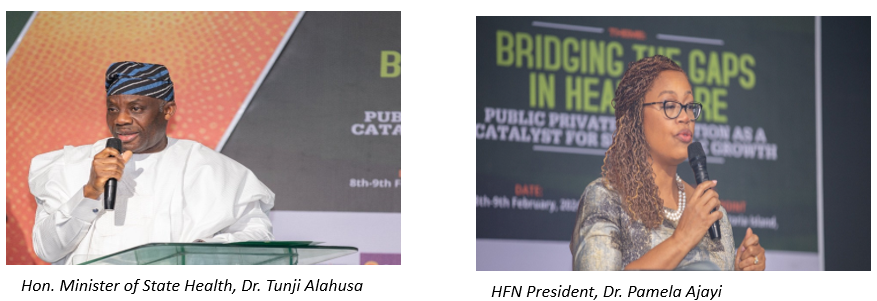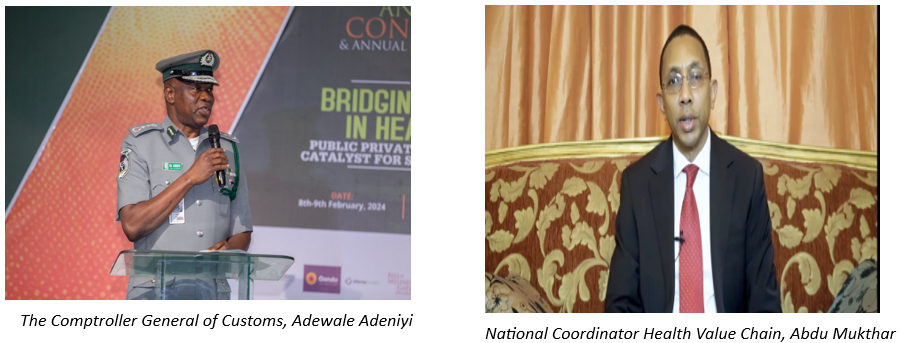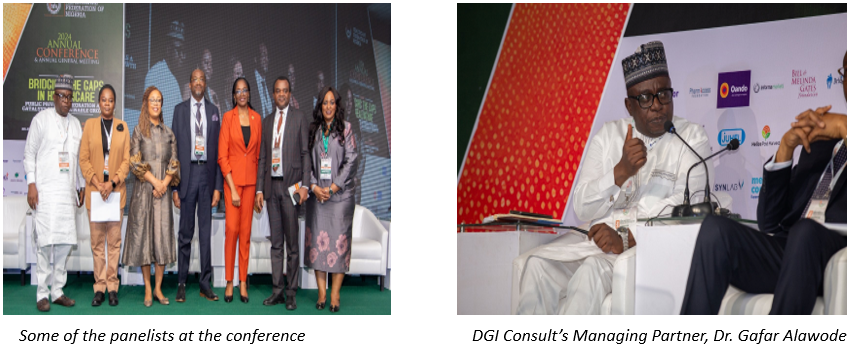The need to integrate private sector resources and actors into the entire health sector value chain took centre stage at the just concluded Annual Conference and Annual General Meeting of the Healthcare Federation of Nigeria. From February 8 to 9, a wide array of stakeholders converges at Harbour Point Victoria Island to deepen the knowledge of the participants, discuss emerging issues and appraise policy options for optimising the private sector contributions to the health sector in particular and economic growth in General.

Dignitaries at the opening ceremony
In her opening address, Dr Pamela Ajayi, the President of the Healthcare Federation of Nigeria, gave an overview of the vision and activities of the Federation and emphasised the need to rethink the relationship between the health sector public and private actors and made a case for a paradigm shift from mere partnership to integration. The Executive Governor of Lagos State, Gov. Babajide Sanwolu, represented by the State Hon. Commissioner for Health, Prof. Akin Abayomi, noted that service delivery is predominately driven by the private sector in the state as the state government only owns about 300 health facilities while more than 3000 private facilities provide health services in the state. He called for a better enabling environment for the private sector to operate and highlighted measures being taken to stem the tide of the exodus of health workers to the developed world, the phenomenon otherwise known as Japa syndrome.

In his own contribution, the Hon. Minister of State for Health, Dr. Tunji Alahusa, noted the diverse nature of the private sector, ranging from NGOs, CSOs, private providers, multilateral bodies and ICT providers. He noted that the private sector has the capacity to fill in the gap and complement government efforts in healthcare delivery, health system strengthening and economic growth. He expressed the desire of the current government to provide an enabling environment for the private sector to thrive. In furtherance of such commitment, he announced the intention of the Federal Government of Nigeria to create a medical industrial hub in each of the country’s geopolitical zones for the production of drugs, vaccines, and medical equipment. He noted that the initiative will unlock billions of dollars of health sector investment.

The Hon. Minister of State for Health also unveiled the plan to introduce Electronic Medical Records that will facilitate the seamless sharing of patient data between primary, secondary and tertiary health facilities. While highlighting government policy response to the depletion of the health workforce due to emigration, he said the FMOH is working with the Lagos State Government on the establishment of the University of Health Sciences to promote massive production of health workers to mitigate the impact of health workforce migration. He said the Federal Government of Nigeria would replicate the initiatives in other states if it proved successful. While responding to the concern that the shortage of tutors will hamper the plan to scale up the production of health workers, he said the technology would be deployed as tutors from abroad will be engaged to lecture students virtually in order to complement the existing pool of local tutors.
The conference also featured a contribution from the Coordinator of the National Health Value Chain Initiative, Dr Abdul Mukthar, who disclosed the desire of President Bola Ahmed Tinubu to optimise the health value chain by boosting local production of drugs, vaccines and equipment to improve access to essential health commodities and equipment, create jobs and accelerate economic growth. The Health Value Chain initiative works with a wide array of Ministries, Departments and Agencies to achieve its objectives. He also stated that a framework for pool procurement to guarantee volume uptake has been developed. He mentioned that Mr President will soon introduce an executive order that backs the policy and regulatory framework for the initiative.
The Comptroller General of Customs highlighted initiatives introduced by customs to ease the clearance of medical goods at the ports of entry, and he called for better collaboration between the health sector actors and Nigerian customs for a seamless clearance of medical goods at the ports. The Minister of Trade also highlighted her ministry’s efforts geared towards improving the country’s health value chain.

The Co-convener of UHC, Dr Gafar Alawode, highlighted the challenges that militate against UHC progress in Nigeria, and he emphasised the need for government at all levels to show more commitment to the UHC cause. He also charged the government and other stakeholders to explore innovative means for mobilising additional resources to expand health insurance to the teeming population, especially the poor and vulnerable. He advocated for the creation of policy on private sector engagement in UHC at all levels, and this should be accompanied by a strong regulation and institutional framework for effective implementation. Among other things, other panel discussion sessions at the conference examined the role of the private sector in Nigeria’s UHC quest, how to promote investment in the health sector and deployment of AI to transform the health system landscape.
Comments are closed.